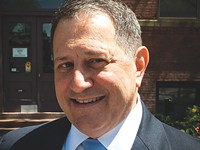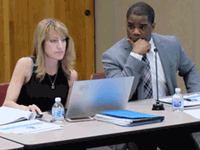[
{
"name": "500x250 Ad",
"insertPoint": "5",
"component": "15667920",
"parentWrapperClass": "",
"requiredCountToDisplay": "1"
}
]
Now, one week after the presidential election, reality has set in. And as noticeable as the horror among Kerry supporters is the shock. It's not so much that we were confident that Kerry would win (not, at least, until the peculiar election-day exit polls said that he would); it's that we didn't seem to recognize the depth and the significance of the division in this country.
This is a dramatically polarized country. And a disconnected one. We do not understand each other, Blues and Reds. We do not know each other.
Over and over, as I talked with Kerry supporters after the election, I heard the same phrases: "Who are these people?" "I just don't understand it. I just don't understand it." "Don't people care about the Bush lies and the war?" "Don't they know that they voted against their own interests?"
Democrats are analyzing the reasons for the solid Bush win (and reaching different conclusions): the attack ads, the constituencies to which each candidate chose to appeal, the role of "values" and fundamentalist voters, the candidates themselves.
Congresswoman Louise Slaughter places some of the blame on the Bush campaign ads --- and on heavily conservative, pro-Bush talk radio. The Kerry message, she says, had trouble reaching a large part of the population.
Slaughter and others also point to the Kerry effort. Kerry's people ran "a bad campaign," says Slaughter; they were insular, unwilling to involve groups like the Congressional women's caucus.
Kerry was "a weak candidate," says historian and former Rochester deputy mayor Chris Lindley. "If Bill Clinton had been the nominee," says Lindley, "he would have eaten Bush for breakfast." And Lindley and others say the problem wasn't just that Kerry was weak; Democrats, they say, didn't have a stronger Democratic contender.
But attorney Michael Miller --- who was Monroe County Democratic Party chair in 1987, when Democrats won races for county executive and county clerk and won the majority of seats in the county legislature --- thinks that given the times, maybe there was little the Kerry campaign could have done to win the presidency.
"I don't blame it on Kerry," says Miller, "or money. There is no question that the country has become more conservative."
And, he says, "when was the last time an incumbent president lost an election during a war?"
"Kerry just got out-strategized," says Rochester School Board member and former Monroe County Democratic Party chair Rob Brown.
"The fact is," says Brown, "if you threaten most people, they become conservative in a lot of areas. What we saw in this race is the difference between brilliant strategy ruthlessly applied and the feel-goodism of people who want change."
"The manipulation of terror is such an exciting political strategy," says Brown. "It's really fabulous, when you think about it. Jerk up the terror rating when you need an improvement in the polls."
But there are deeper issues in the election results. "(W)hat troubled me yesterday," wrote New York Times columnist Thomas Friedman on November 4, "was my feeling that this election was tipped because of an outpouring of support for George Bush by people who don't just favor different policies than I do --- they favor a whole different kind of America. We don't just disagree on what America should be doing; we disagree on what America is."
In my most pessimistic moments, I agree with Friedman. Certainly the moral-values thing is deeply troubling. There are some issue differences among Americans --- homosexuality, abortion rights --- that reflect deeply held, highly emotional beliefs. And, in the case of homophobia, there is an almost primeval fear.
Gay rights continue to be one of the key civil-rights issues of the day, and that struggle will not be won easily or quickly. Concern over same-sex marriage unquestionably cost Kerry votes, among African-American and Latino voters as well as among whites. And yet attitudes toward homosexual and bisexual Americans are changing, and polls indicate that younger people are far more understanding on this issue than older ones. And fundamentalists and the Catholic Church hierarchy are not an insurmountable obstacle to abortion rights, any more than they have been (for the most part) on birth control.
And the fact is, homosexuality and abortion are not the only "religious" issues. Fundamentalist voters are not the only Americans with strongly held religious faith. And you do not have be a fundamentalist, or go to your house of worship regularly, or speak openly about your religious beliefs, to have a strongly held faith. Nor do you have to have "religious faith" to have strongly held "moral values." (Those much-publicized "moral values" voters were, after all, only 22 percent of the electorate.)
And yet... and yet... Friedman's view of the voters to the contrary, I think there are some key, core agreements, agreements that transcend the Red-and-Blue divide. The country may be becoming more conservative, but conservatives tend to be fiscally conservative. And increasingly, conservative voices across the country are raising alarms about the deficit and the costs of the Iraq war. And the Bush administration's justification for the deaths in Iraq --- ours, Iraq's, other nations' --- will hold up only for so long.
I grieve over some Red voters' apparent lack of concern over the violation of the rights of prisoners --- but at heart, I think, we are a decent people, Reds as much as Blues.
It is hard, though, in the wake of the Bush victory, not to be pessimistic, at least concerning the immediate future. "Four years ago," said the New York Times on November 4, "when Mr. Bush lost the popular vote and seemed to be in a position where consensus-seeking was a given, White House officials thought about taking a compromise centrist route 'for about 30 seconds' before grabbing their old partisan agenda and running with it. In his speech yesterday, Mr. Cheney stressed the president's mandate. Given the way Mr. Cheney behaved during the first term, it's unnerving to imagine what he may have in mind now."
Power corrupts, and I have little doubt that the Bush administration will move quickly with a number of terrible initiatives. I'd like to hope that Democrats and moderate Republicans will be able to check a Bush steamroller, that voters in individual states and districts will keep their congressional representatives in line. That would mean that those voters would need to pay attention to what the Bush administration is doing and speak out. It would mean that environmental activists, peace activists, civil-rights activists, reproductive-rights activists, and others would have to become energized, that the anti-Bush 527's would have to keep raising money and keep working.
It would mean that the Blues would have to find a way to bridge the faith gap. They did not find a way, in the 2004 election, to do that. They did not find a way to bridge what became a serious gap of understanding and communication. But it can be done, and it can be done without cynicism, without pandering, without hypocrisy.
The nation has changed course too many times to deny that possibility. And the division among Americans is not new. There was division during the Vietnam War. During the Civil Rights era. During the Civil War. At, in fact, the birth of the nation, whose founders had starkly different ideas about what the country should be.
The answer lies in finding common ground. And there, the Red-and-Blue map should be a wake-up call to Bush opponents. Blues do not know the Reds. And, it's important to say, Reds do not know the Blues.
And I suspect that a fair number of us have not even wanted to know the other.
Some of the most interesting dialogues I've encountered since November 2 have been e-mail discussions among journalists: environmental writers and editors of alternative newspapers like this one. The environmental writers wrestled with the failure of environmental issues to catch fire with Bush supporters, many of whom live in states where environmental problems are a big concern. But, said one, many Americans live in the suburbs, where the environment seems --- to them --- to be in good shape, and issues like taxes are more important.
The alternative editors --- overwhelmingly liberal --- ranted a bit, and then turned to self-analysis. A common thread: Many of them felt that their segment of the profession has lost touch with ordinary Americans. And so has their core, liberal readership.
Some of the local Democrats I interviewed expressed similar concerns about liberal Democrats. "We talk to ourselves," says Michael Miller.
"Those of us who know better than everybody else," says Rob Brown, "are contemptuous of the Woodchucks" --- Brown's word for the way many Blues view Reds. ("Karl Rove is as contemptuous of them as we are," says Brown, "but he doesn't let it stand in the way of his strategy.")
One indication of Kerry supporters' self-delusion: their excitement over their candidate's performance in the debates. To Bush voters, that didn't matter. As one Bush supporter said later, Bush was not running for Debater in Chief. He was running for Commander in Chief.
Another indication: Many Blues seem to think that the Red electorate consists of poorly educated yahoos. But according to Sunday's New York Times, Bush won the support not only of high-school-graduate voters but also of college graduates. Kerry won the post-graduate vote.
Many Kerry supporters are convinced that many Reds were voting against their own interests. With the deficit rising, tax cuts going to the wealthy, Bush in bed with corporate interests, states like Ohio experiencing a tough economy, how could blue-collar workers vote for Bush?
But were they voting against their own interests? Or do we just think they were? Were they voting against their interests aswe define them?
"The country has come under stress," says Rob Brown. "When you're under stress, when you lose your job, when your religious principles are under stress, you become more conservative in a lot of ways."
"I'm confident they didn't think they were voting against their own interests," says Brown. "People are too complex to categorize them as simply economic engines. People vote for a whole lot of complex reasons."
We don't know each other.
In the alternative newspapers' on-line discussion, one editor worried that when his colleagues urged a better understanding of Bush supporters, they were suggesting a compromise on principles. They were not. Those of us who oppose Bush can stick to our principles and still win elections and set the country on the right track. But clearly one lesson from last week's election is that we can't do it without listening, we can't do it without understanding, we can't do it if we're condescending.
John Kerry was accused of being too patrician, too removed from the concerns of ordinary Americans, of seeming artificial and aloof even if he wasn't. And remoteness was said to be one cause of the defeat of Bush II's father. But one of the most patrician presidents this country has had was Franklin Roosevelt, who was loved by common people, and whose super-patrician wife was embraced by the conservative coal miners of Southern Appalachia with something close to adoration.
"But Roosevelt," says Chris Lindley, "had a glowing personality. Kerry just didn't have that ability to project."
"Roosevelt was a passionate economic nationalist," says Lindley, and when he talked about the Depression, he talked about stimulating purchasing power. "That had enormous appeal in the rural areas," says Lindley.
"Roosevelt was speaking to the needs of the common people," says Michael Miller. "Democrats," he says, "have to have candidates that connect with people."
And, says Miller, Democrats have to start understanding the American people. "Listen to them," he says. "Don't disparage them."
"I'm not disheartened," says Rob Brown. "It didn't come out the way I wanted, but it was democracy working."
And for the future? "It's going to be awfully important for people to figure out what others are complaining about," says Brown.
Four more years
It will be a difficult four years, and Democratic Congresswoman Louise Slaughter is worried --- and pessimistic. She is concerned not only about what the Bush administration will do but also about the new strength in the House and the Senate. "We had one guy elected to the Senate who said doctors who perform abortions ought to be killed," says Slaughter. "Another said that gays and single mothers shouldn't teach in public schools."
"I'm most worried about the Supreme Court," she says. "I didn't like what they did when they chose Bush. It was a coup d'état. And I think it's going to get worse." Abortion rights, prayer in the schools, the separation of church and state... Slaughter's list of concerns is a long one: "Social Security will be privatized. Medical savings accounts are going to happen. The labor movement will die; they'll be under constant assault. The right to sue.... We simply do not have the votes any more."
"I expect constitutional amendments to fall on us like rain," says Slaughter.
Former Monroe County Democratic Party chair Rob Brown is not so sure. And he's not so pessimistic. "It's still the case that 48 percent of the people don't like the policies the current administration is pursuing," he says.
And, says Brown, "The fact is that each of those congresspeople have to run in their own district. "You don't dismiss large blocks of your constituency."
"It's one thing to pontificate about gay marriage," says Brown. It's another to have to come back home and face gay-rights voters.
And former party chair Michael Miller says dejected Kerry supporters shouldn't be focusing solely on the 2008 presidential race. "Bush has an 18-month window," he says. "After that, the campaign for Congress begins."
Other articles related to the topic
Post-mortem:shock and awe in Ohiohere!
Speaking of...
-

Commentary: How long is too long for a presidential campaign?
Feb 25, 2020 -

Morelle wins House primary
Jun 26, 2018 -

House primary vote is today
Jun 26, 2018 - More »
Latest in News
More by Mary Anna Towler
-

Police reform: advocates on what should come next
Oct 22, 2019 -

Court clears the way for Police Accountability referendum
Oct 17, 2019 -

Dade outlines initial actions on district deficit
Oct 9, 2019 - More »





